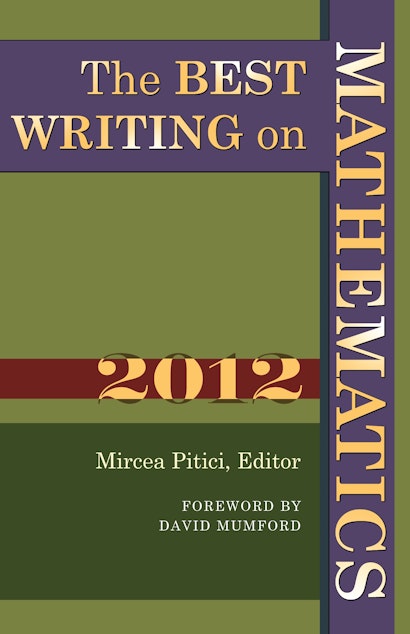This annual anthology brings together the year’s finest mathematics writing from around the world. Featuring promising new voices alongside some of the foremost names in the field, The Best Writing on Mathematics 2012 makes available to a wide audience many articles not easily found anywhere else—and you don’t need to be a mathematician to enjoy them. These writings offer surprising insights into the nature, meaning, and practice of mathematics today. They delve into the history, philosophy, teaching, and everyday occurrences of math, and take readers behind the scenes of today’s hottest mathematical debates. Here Robert Lang explains mathematical aspects of origami foldings; Terence Tao discusses the frequency and distribution of the prime numbers; Timothy Gowers and Mario Livio ponder whether mathematics is invented or discovered; Brian Hayes describes what is special about a ball in five dimensions; Mark Colyvan glosses on the mathematics of dating; and much, much more.
In addition to presenting the year’s most memorable writings on mathematics, this must-have anthology includes a foreword by esteemed mathematician David Mumford and an introduction by the editor Mircea Pitici. This book belongs on the shelf of anyone interested in where math has taken us—and where it is headed.
"Compiling a good anthology is no easy task, but here Mircea Pitici has succeeded in putting together a wonderful and varied bouquet of texts related to mathematics. . . . I highly recommend this book to everyone with an interest in mathematics, whether they are professional mathematician, graduate or undergraduate students, teachers, or enthusiastic amateurs."—Stephen Buckley, Irish Mathematical Society Bulletin
"The book addresses not only mathematicians but everyone who is interested in this field. The range of topics that are covered in this book is really impressing. . . . The editor has selected articles that really deserve to be read again. I can warmly recommend this book."—Ehrhard Behrends, Zentralblatt MATH
"I recommend this book to Gazette readers as enjoyable bedside reading."—Phill Schultz, Australian Mathematics Society Gazette
"The volume is suitable for casual browsing and for extended reading. The choices are entirely worthy of inclusion in a volume of the 'best' mathematics writing."—Mark Bollman, Mathematical Reviews
"Mircea Pitici, the editor, pulls together work at various levels of complexity and from authors who pursue their subjects from a number of angles: historical or biographical narrative, philosophical speculation both professional and amateur, journalistic commentary on the state of math education and its discontents. And the arrangement of the material is . . . intelligent and even artful. Certain figures and questions weave in and out of this volume—making it more unified than 'best of' annuals tend to be."—ScottMcLemee, Inside Higher Ed
"Each of the essays is interesting, readable, and purposeful. . . . The contributors are some of the best brains from universities all over the world."—R. Balashankar, Organiser
"This is indeed a collection of the most wonderful writings on mathematics that have appeared recently. Not elementary at all and yet accessible to a general audience. Of course this is just the top of a gigantic iceberg, a top that has been selected on the basis of space and copyright limitations."—A. Bultheel, European Mathematical Society
"[B]e sure to take a look at the book; odds are good that you'll find something in it that strikes your fancy. As somebody who enjoys expository articles but generally doesn't have the time to track them down and read them, finding a hand-picked collection like this assembled in one place was a delight."—Mark Hunacek, MAA Reviews
"Long ago it was possible for physics and mathematics (both applied and pure) to coexist in one person's mind, where developments in all three could occur. Archimedes calculated the volume of a sphere and created the lever. Newton did calculus and studied gravity. With the growth of these fields, however, it is no longer possible to deeply study them all. This is why, even with expositions for the layperson, writings like this are so important."—Edward Charles Keppelmann, Mathematical Reviews Clippings
"It is clear from this, and from many other essays in this book, that mathematical creativity is still alive and well."—Gerry Leversham, Mathematical Gazette

